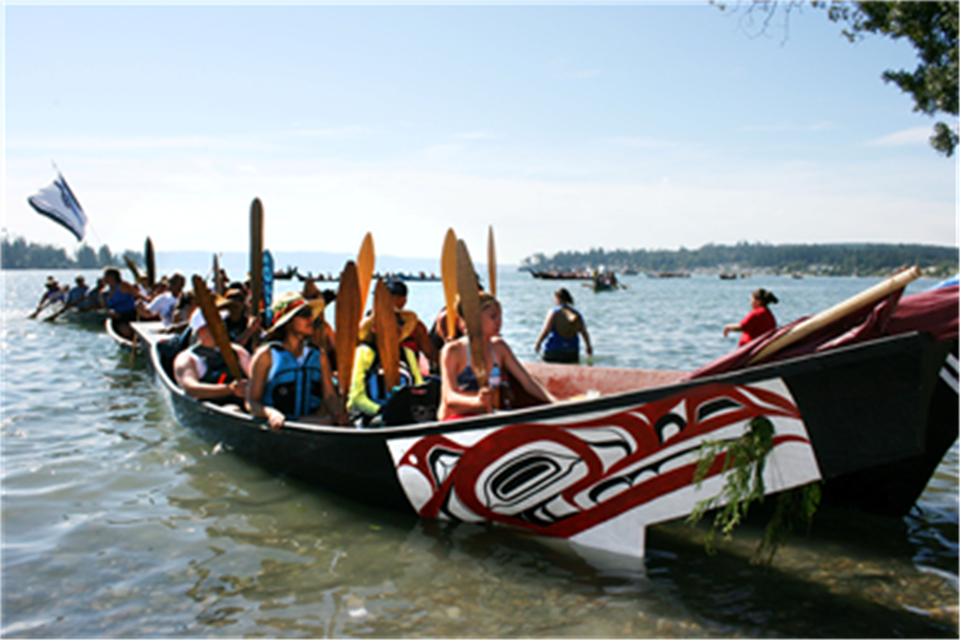Words of Welcome
Words of Welcome
As we approach the one month mark before the start of the 21st annual American Indian Tourism Conference in Tulsa, Oklahoma, we look forrward to welcoming delegates from many of the sovereign nations around the United States.

With so many tourism professionals and cultural heritage experts in one place, we want to be sure to extend a warm welcome to our attendees in as many languages as possible.
We queried our tribal partners and other experts and asked how they say “Hello” or “Welcome” in their Native languages. (Thanks to all who participated, and as always, it’s never too late to submit your own additions.)
Abenaki Language, Penobscot Nation, Maine
| I greet, welcome him | məpehkʷíhlαmα | |
| Hello! | kkʷēyˊ |
Alutiiq (Suqpiaq), Alaska
| How are you? / Hello | Cama’i (Cha-My) | |
| Thank you | Quyanaa (Coy-yana) |
Arikara Language, Three Affiliated Tribes; Mandan, Hidatsa and Arikara Nation; North Dakota
| Hello | Geed |
Chickasaw, Chickasaw Nation, Oklahoma
| Hello | hallito |
Cherokee, Eastern Band of Cherokee Indians, North Carolina
| Hello | Siyo |
Eyak Language, Eyak Village, Alaska
| Hello | Iishuh | |
| Welcome | Awa’ahdah aanda’IAXshA’a’chL |
Hidatsa Language, Three Affiliated Tribes; Mandan, Hidatsa and Arikara Nation; North Dakota
| Hello | Dosha- |
Mahican Dialect, Stockbridge – Munsee Tribe of Wisconsin
| How are you? | Koonumunthe | |
| I am fine | Noonumunthe | |
| Glad you made it to morning (When addressing a group, add “hima”) | Kwãapunuxeen | |
| Glad you made it to evening (When addressing a group, add “hima”) | Koonnãakxeen | |
| How are all of you? | Koonumutheʔmã |
Mandan Language, Three Affiliated Tribes; Mandan, Hidatsa and Arikara Nation; North Dakota
| Hello | Du shka sha- |
Miccosukee Language, Seminole Tribe of Florida
| How are you?; how’s it going? A form of greeting but the meaning varies depending on how it’s used |
Che-hen-ta-mo? |
Mohawk Language, Akwesasne (St. Regis Mohawk Tribe), New York
| “Do you still have the Great Peace?” | “Shé:kon skennenkó:wa ken” | |
| Today the greeting is shortened in Akwesasne | “Shé:kon!” |
Northern Paiute, Nevada
| How are you? | Hau u |
Ojibwemowin (Ojibwe) Language; Red Cliff Band of Lake Superior Chippewa, Wisconsin
| Greeting | Boozhoo | |
| Hello | Aanii |
‘Ōlelo Hawai‘i (Hawaiian Language)
| Hello | Aloha | |
| Welcome, to say to people | Welina | |
| Welcome, as in a warm greeting | Heahea |
Osage Nation, Oklahoma
| Hello | Hawey |
Shawnee, Shawnee Tribe, Oklahoma
| Hello | Aho | |
| Welcome | Picfako |
Sugcestun Language, Eyak Village, Alaska
| Hello | Camai | |
| Welcome | Tai ggut itra |
Twulshootseed, Puyallup Tribe of Indians, Washington
| How are you? | ʔəsx̌id čəxʷ | |
| Good day | haʔł sləx̌il | |
| We are joyful that you folks have arrived | ʔəsǰuʔil čəł ʔə ti sułəčilləp | |
| We are joyful to see you folks | ʔəsǰuʔil čəł ʔə ti səslaʔbdubułəd |
Unangax (Aleut) Language, St. Paul Island, Alaska
| Hello & Welcome. | Aang (Pronounce like ‘song’) |
Unangam tunuu (the Aleut language), Aleutian Pribilof Islands Association, Alaska
| Hello & Welcome. | Aang | |
| Hello. | Aang Aang |
Note: The words and phrases in this post were provided by members of the tribes listed. Spellings and translations may vary. Some words may be missing accents or symbols due to limited characters on a keyboard.
We’re happy to add your language and/or hear corrections and suggestions on spellings and translations, so feel free to contact us at info@aianta.org.
Year of Indigenous Languages
Learn more about the year of Indigenous Languages and view more posts in AIANTA’s Native Greetings series here.
Photo credits: Top image: Oneida Nation of Wisconsin; Canoe image: Tulalip Tribes.